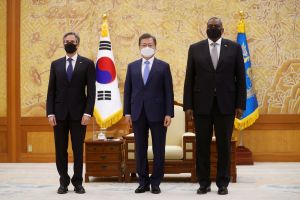South Koreans See China as More Threat than Partner, But Not the Most Critical Threat Facing the Country

Majorities of South Koreans cite low birthrates in South Korea and North Korea’s nuclear program as larger threats than China's economic or military power.
In South Korea, unfavorable views of China are now on par with views of North Korea and Japan, and 59 percent say South Korea and China are mostly rivals. Specifically, clear majorities think China is more of an economic and security threat than a partner. But neither China’s economic power nor its military power are considered the top critical threats facing the country. Instead, larger majorities cite low birth rates in South Korea and North Korea’s nuclear program.
Key Findings
- On a 0-10 scale, where 0 is least favorable and 10 is most favorable, China receives a mean score of 3.1, comparable to North Korea (2.8) and Japan (3.2). The United States, meanwhile, is rated at 6.0. When last asked in 2019, China was at 4.8. The other countries have remained stable over that period.
- When it comes to China’s intentions, a large majority of Koreans think China seeks to displace the United States either as the most dominant power in the world (60%) or as the dominant power in the Asia-Pacific (28%). Just 8 percent say China does not seek to replace the United States.
- Sixty percent say China is more of an economic threat while 37 percent see it as more of an economic partner. And 83 percent say China is more of a security threat with just 12 percent saying it is more of a security partner.
- Yet, only half (53%) think China’s military power is a critical threat facing the country, and 51 percent say the same about China’s economic power. Larger majorities view low birth rates in South Korea (81%), climate change (76%), and North Korea’s nuclear program (62%), and the COVID-19 pandemic to be critical threats.
- The growing US-China competition is not yet ringing alarm bells among the public. While nine in ten (88%) say the United States and China are rivals, just 49 percent say competition between the United States and China is a critical threat to South Korea.
- Three-quarters (74%) of South Koreans say the US military presence in the Asia-Pacific increases stability. And 84 percent say the US military presence in the Asia-Pacific should either be increased (15%) or maintained at its present level (68%).
Methodology
The survey was conducted March 24–28, 2021 in South Korea by Hankook Research among a representative national sample of 1,000 adults aged 19 and over. The sample was constructed using RDD for mobile and landline phones and the margin of error is ±3.1% at the 95% confidence interval. The survey was designed with input from Korean, American, and Japanese scholars as part of a broader project focusing on trilateral coordination in the Asia-Pacific. Results from the US survey can be found here. Results from Japan are forthcoming.



